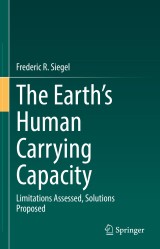Details

The Earth's Human Carrying Capacity
Limitations Assessed, Solutions Proposed|
117,69 € |
|
| Verlag: | Springer |
| Format: | |
| Veröffentl.: | 02.08.2021 |
| ISBN/EAN: | 9783030734763 |
| Sprache: | englisch |
Dieses eBook enthält ein Wasserzeichen.
Beschreibungen
This book focuses on the Earth’s carrying capacity to service the needs of its human populations as well as preserve the ecosystems that provide natural resources that sustain life and support human activities in 2020 and later in the century (2050 and beyond). It addresses the two principal factors that challenge the limits of the carrying capacity: growing populations/demographic moves and global warming/climate change. It also covers the effects that these factors have on water availability, food security, sanitation and natural resources. The status of these basic needs that sustain life and societal activities with respect to population increases and global warming driven climate changes are discussed on two time frames. One with respect to the 2020 and the other with measured and computer guided projected future impacts later as the century progresses to 2050 and later, Attention is given to Africa, Asia, and somewhat for South America because of their projected increases in population.<div><br></div><div>The purpose of the book is to provide those in decision-making roles and those that advise them with a sound set of facts and figures to think about to support their decisions/actions. A secondary purpose is to present data that stresses the need to act now, firmly and with investment to plan to adapt to changing conditions rather than wait until forced to do so. The book also discusses how the COVID-19 pandemic has affected the world’s societies and how they have reacted. The book will be of use to students in first/second year of college/university programs in Environmental Sciences/Studies, demographics, and ancillary fields such as agriculture science, urban/land use planners, political science, public health, and consultants at academic and professional levels.<div></div></div>
<p>Chapter1.- Earth’s Human Carrying Capacity: The Basics.- Chapter2.- Water: A Limit On Our Earth’s Carrying Capacity.- Chapter3.- Food Security/Insecurity, Food Systems.- Chapter4.- Impact of Global Warming/Climate Change On Food Security 2020.- Chapter 5.- Sanitation: Waste Generation/Capture/Disposal Status 2020.- Chapter6.- Access To Natural Resources Not Water Or Food 2020.- Chapter7.- Global Warming And Water 2050: More People, Yes; Less Ice, Yes; More Water, Yes; More Fresh Water, Probably; More Accessible Fresh Water.- Chapter8.- Food 2050 - More Mouths To Feed: Food Availability and Access.- Chapter9.-Sanitation 2050.- Chapter10.- Natural Resources Beyond Water And Food 2020 To 2050.- Chapter11.- Economic Realities in 2020 Populations: What do they Portend for 2050? 2100?</p><p></p><p></p>
<p></p>
<p></p>
<p></p><p></p>
<p></p>
<p></p>
<p></p>
<p></p>
<p></p>
<p></p>
<p></p><p></p>
<p></p>
<p></p>
<p></p>
<p></p>
<p>Dr. Frederic R. Siegel is Professor Emeritus at The George Washington University. His books Applied Geochemistry (1974), Geoquimica Aplicada (1991), Natural and Anthropogenic Hazards in Development Planning (1996), Environmental Geochemistry of Potentially Toxic Metals (2001/2002), Demands of Expanding Populations and Development Planning (2008), Countering 21st Century Social-Environmental Threats to Growing Global Populations (2015), Mitigation of dangers from Natural and Anthropogenic Hazards (2016), Cities and Mega-Cities (2018), and Adaptations of Coastal Cities to Global Warming, Sea Level Rise, Climate Change and Endemic Hazards (2020) reflect Dr. Siegel’s cumulative teaching and research experience in theoretical and applied exploration and environmental geochemistry, and his work to alleviate or eliminate environmental problems related to physical, social, chemical, and economic conditions associated with planned development projects.</p>
This book focuses on the Earth’s carrying capacity to service the needs of its human populations as well as preserve the ecosystems that provide natural resources that sustain life and support human activities in 2020 and later in the century (2050 and beyond). It addresses the two principal factors that challenge the limits of the carrying capacity: growing populations/demographic moves and global warming/climate change. It also covers the effects that these factors have on water availability, food security, sanitation and natural resources. The status of these basic needs that sustain life and societal activities with respect to population increases and global warming driven climate changes are discussed on two time frames. One with respect to the 2020 and the other with measured and computer guided projected future impacts later as the century progresses to 2050 and later, Attention is given to Africa, Asia, and somewhat for South America because of their projected increases in population.<div><br></div><div>The purpose of the book is to provide those in decision-making roles and those that advise them with a sound set of facts and figures to think about to support their decisions/actions. A secondary purpose is to present data that stresses the need to act now, firmly and with investment to plan to adapt to changing conditions rather than wait until forced to do so. The book also discusses how the COVID-19 pandemic has affected the world’s societies and how they have reacted. The book will be of use to students in first/second year of college/university programs in Environmental Sciences/Studies, demographics, and ancillary fields such as agriculture science, urban/land use planners, political science, public health, and consultants at academic and professional levels.</div>
<p>Focuses on the Earth’s carrying capacity to service the needs of its human populations and preserve ecosystems</p><p>Provides a realistic assessment of where the world is now with respect to global populations and what can be done to adapt to changes</p><p>Discusses how the COVID-19 pandemic has affected the world’s societies and how they have reacted</p>
Diese Produkte könnten Sie auch interessieren:

The Vicuña

von: Iain Gordon, Jane C. Wheeler, Hugo Yacobaccio, Jerry Laker, Marcelo Cassini, Mariela Borgnia, Yanina Arzamendia, Verónica Benítez, Bibiana Vilá, Cristian Bonacic, Jessica Gimpel, Pete Goddard, Desmond McNeill, Gabriela Lichtenstein, Renaudeau d' Arc Nadine, Kristi Anne Stølen, Javier García Gomez, Ana Wawrzyk

96,29 €

Saving Biological Diversity

von: Robert A. Askins, Glenn D. Dreyer, Gerald R. Visgilio, Diana M. Whitelaw

96,29 €

Martens and Fishers (Martes) in Human-Altered Environments

von: Daniel J. Harrison, Angela K. Fuller, Gilbert Proulx

149,79 €













